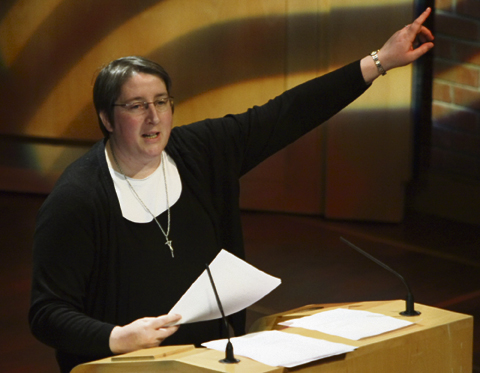July 8 | ![]() 0 COMMENTS
0 COMMENTS ![]() print
print

A Catholic feminist is no contradiction
Pro-life and feminism—who is to say you can’t be a feminist simply because you are a faithful Catholic?
By Sr Roseann Reddy
I am a woman, I’m pro-life, I’m an RC religious sister and I’m a feminist, so get over it. I’m not going to apologise for any of the above so, if that’s a problem for you, well, that’s your problem, as they say. So what has brought on this sudden desire to make this declaration? Well, I’ve just become a wee bit scunnered with the way feminism has been hijacked by people who say I can’t be a feminist because I’m pro-life or because I am trying to be a Faithful Catholic.
Both of these things seem to be a bar because not only am I allegedly against choice, I am also a willing and, indeed, active and contented member of a Church which is often seen as anti- women and anti-equality, primarily because of its pro-life stance, its teaching on women and an all-male priesthood. To be honest, I’m just a bit bored with it all now. I’m also very disappointed at the level of intellectual debate about feminism in our society.
Now don’t get me wrong, I’m not about to start a debate, intellectual or otherwise, in the great Scottish Catholic Observer. I don’t really think that’s what most people want with their roll and sausage on a Sunday morning. But I would just like to stimulate our little grey cells a wee bit.
Firstly, what is feminism? The Oxford English Dictionary states: “Feminism—the advocacy of women’s rights on the ground of equality of the sexes.” Well, by that definition, I’m definitely a feminist. All my life I have believed that men and women are equal but different, created by God in equality and complimentary, one to the other. All of us wonderfully and beautifully made; all of us with an innate dignity that comes from being sons and daughters of the one Father.
As such, we deserve the same rights and opportunities in education, in employment, in social mobility, the arts and sport. But rights must be based on reality and truth. And the truth is we are equal but distinct: we are physically different and we have different strengths, and this is no mistake—it’s at the heart of who we are. ‘Male and female, he created them.’
Currently you can’t put on the TV or radio, pick up a newspaper or magazine, without the issue of gender being raised. The confusion it can cause is quite alarming. What are we doing to our future generations when we put such choices before them as to which of the plethora of official genders recently approved by the Scottish Government they consider themselves to be?
Don’t get me wrong, I know that for a tiny minority of people their gender identity can be a real issue. They can feel trapped in a body that they don’t identify with, that they really struggle to come to terms with. For those with real and genuine issues, we must have total compassion and care. What currently irritates me are those who have jumped on the band wagon and for whom gender has become a lifestyle choice. I really do believe that in most circumstances now, it’s nurture, not nature, that is causing such massive confusion with often devastating consequences for the individual and their family. I’m also thoroughly convinced that for most people just trying to get on with their lives, this is simply a non-issue.
The transgender, gay, lesbian and bisexual community makes up a small percentage of our society, yet hardly a day goes by in the media without there being some reference—subtle or otherwise, to these issues. And people are afraid to say anything that goes against this current trend for fear of accusations of being homophobic, judgemental, ‘unchristian.’ People are even afraid of the risk of prosecution, and yet there are some things that need to be said. My main concern is the scornful way in which the truths of our Catholic Faith are, at best, dismissed, and at worst, vilified—while so many other alternative lifestyles are promoted and praised.
I read a great saying the other day from St Teresa Benedicta of the Cross: “Do not accept anything as the truth if it lacks love. And do not accept anything as love which lacks truth.” Nowadays, even to say there is such a thing as truth is controversial and yet that is what we, as Catholics, believe. And there are consequences from our moving away from certainties, from truth and from God.
Why do we seem to have so many unhappy and discontented people, and especially young people, in our society? What kind of future are we really leaving our children and grandchildren when the overwhelming atmosphere of our culture seems to be that whatever makes you happy, you must have—regardless of the effect on those around you or on the wider society. So if you’re not happy in your relationship, in your marriage, with your gender, with your church or even with your God, then all of these things should mould to your way of thinking and feeling, or suffer the consequences. Well, these consequences are felt by all of us. The breakdown in so many personal lives, so many families torn apart, the rejection of God, all of these things affect all of us.
On a happier, more positive note, there really is very little new under the sun, as the saying goes, and for those of us who believe in eternal life, we have an unchanging answer to all of the confusion of the world.
In short, there are three things that last: “Faith, hope and love; and the greatest of these is love.”











